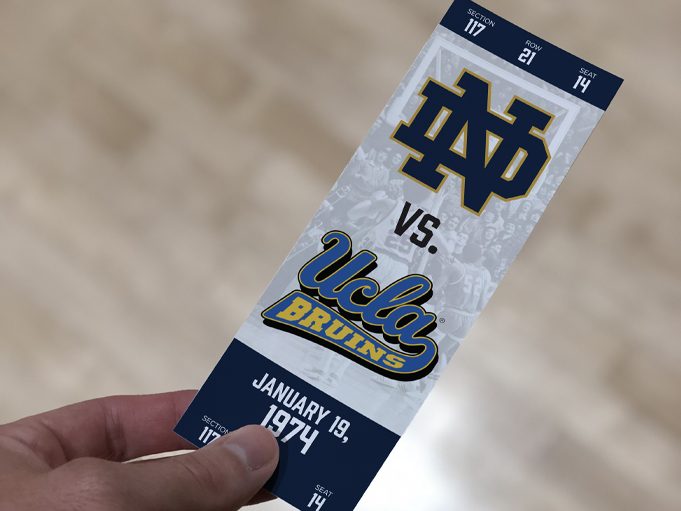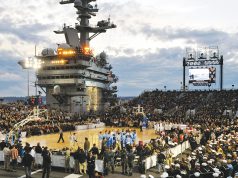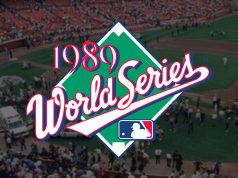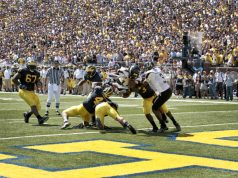There are only three “streaks” in sports that matter: DiMaggio’s 56-game hitting streak, Ripken’s 2,632 consecutive game “iron man” streak and UCLA’s 88-game winning streak. Retired referee Rich Weiler was the “bookend” official for UCLA’s 88-game streak, working the last game the Bruins lost before embarking on that Herculean effort, and the next one the team lost 89 games later to Notre Dame.
Notre Dame Basketball Coach Digger Phelps, the son of an undertaker, had just overseen the burial of the longest winning streak in the history of U.S. team sports.
But all referee Rich Weiler could think of was his safety. Dwight Clay canned an 18-foot jumper from the corner to give the second-ranked Irish a riveting 71-70 victory over number-one UCLA at the Athletic and Convocation Center in South Bend, Ind., on Jan. 19, 1974. Clay’s bucket not only toppled the Bruins from their perch atop the polls, it brought to a crashing halt UCLA’s monumental 88-game winning streak.
Weiler, who officiated the game with partner George Solomon, took cover when the final horn sounded.
“Pandemonium broke out, I ran for the stanchion on the basket and stood there so I wouldn’t get run over. The fans came out of the stands like bumblebees.”
“Pandemonium broke out,” recalls Weiler. “I ran for the stanchion on the basket and stood there so I wouldn’t get run over. The fans came out of the stands like bumblebees.” They swarmed the Irish, who had vanquished what Phelps called “probably the greatest college basketball organization ever put together.” That wasn’t hyperbole: The Bruins had won the last seven NCAA championships and 222 of their previous 227 games. They were the Harlem Globetrotters to everyone else’s Washington Generals. “UCLA never lost,” says Weiler, who retired in 1987 after 23 seasons as a college official. “For them to lose … if UCLA lost two games in a year, that was a disaster, you know?”
In fact, Coach John Wooden’s Bruins hadn’t tasted defeat in nearly three years, not since Jan. 23, 1971. The opponent? Notre Dame. The site? The Athletic and Convocation Center. And in a delicious bit of irony, Weiler worked the game. He served as a bookend of sorts for UCLA’s record streak, officiating in the only two losses suffered by the Bruins in a 90-game span.
Not that Wooden ever broached the subject with Weiler.
“He never said a word,” Weiler recalls. “I just had wonderful dealings with Coach Wooden, always had a good relationship with him. Even today, I’ll see him at a tournament or something and we’ll say hello.”
Saying goodbye to UCLA’s streak occupied Phelps’ thoughts the day before the game. He hauled ladders onto the floor at the close of practice and instructed his players to climb up and pantomime cutting down the nets. “You’re going to be able to tell your grandchildren about this,” Phelps said.
It was an especially bold prediction, given that UCLA had won its last four games against the Irish by an average margin of 32 points. The Bruins stomped Notre Dame, 82-63, in the teams’ previous meeting in South Bend a year before, thereby eclipsing the NCAA record of 60 consecutive victories set between 1954 and 1956 by the University of San Francisco.
The rematch followed a familiar script at first. All-America center Bill Walton, wearing an elastic corset because of a sore lower back, helped UCLA bolt from the starting gate. The Bruins built a 17-point bulge, lulling the 11,343 fans in attendance and a national television audience into believing they were witnessing the latest in a long line of UCLA victories.
The Bruins still led, 70-59, with a little over three minutes left, their 89th consecutive victory seemingly secure. But the tide was about to turn.
“You know what Yogi Berra says – it ain’t over ’til it’s over,” says Weiler. “You make a turnover, miss a couple shots, the other team takes advantage and before you know it, they’re on a roll and the momentum swings a little bit. Now all of a sudden you’ve got a ballgame.”
The Bruins, renowned for their discipline, began to crumble like Poe’s House of Usher. They committed five turnovers and missed all five of their shots in the final three minutes. The collapse was utterly out of character, as if Mr. Rogers had thrown a tantrum.
Center John Shumate triggered Notre Dame’s game-ending 12-0 run, feathering a hook shot over Walton with 3:07 remaining. He then stole the ensuing inbounds pass and made a layup, slicing the deficit to seven. When Adrian Dantley followed with a steal at midcourt and drove the lane for another bucket, the decibel level inside the Athletic and Convocation Center approximated that of a 747 at takeoff.
Guard Gary Brokaw, who scored a game-high 25 points, canned back-to-back shots to bring the Irish to within one. When Ray (Dice) Martin drew a charge on UCLA’s Keith Wilkes moments later, the stands shook as if an earthquake had struck.
“I can’t recall that play,” says Weiler when asked if the call was beyond dispute or not. “But I don’t remember either coach coming after us that day. When you leave an arena after you work a game, you know if you’ve done a good job. I’d be the first one to admit I made a mistake, but I felt pretty good after that game.”
Wooden never complained about the call. He sat stoically on the bench, gripping a rolled-up program in his hand. He didn’t even budge when Clay took a pass from Brokaw in the corner and, with 29 seconds left, sank the shot that gave Notre Dame its first lead of the afternoon.
The Bruins had plenty of time to respond, but they misfired on a flurry of shots before Shumate grabbed the rebound that sealed UCLA’s fate.
The Bruins’ unparalleled stretch of perfection – one of the most extraordinary achievements in sports history – became history on that midwinter Saturday at South Bend. But the following week, UCLA faced Notre Dame again – this time on the Bruins’ home court. The next day’s Daily Bruin headlines read, “Bruins Exorcise Irish, 94-75.”
Coincidentally, the Bruins suffered a disproportionate number of milestone defeats in Weiler’s presence. He worked the first of his five Final Four assignments in 1974 and was on the floor when North Carolina State outlasted UCLA, 80-77, in a double-overtime semifinal thriller, ending the Bruins’ record streak of 38 consecutive NCAA tournament victories. Weiler also worked the 1980 title game, in which Louisville snapped UCLA’s 10-game winning streak in NCAA finals, 59-54.
But neither of those losses, it can be argued, was as shocking as the Bruins’ defeat at the Athletic and Convocation Center in 1974. Notre Dame’s stirring comeback ended a streak that will likely never be threatened, much less surpassed.
“I don’t think you’ll ever see anything like that again,” Weiler says. “It’s like DiMaggio hitting in 56 consecutive games. Some records will just never be broken. I can’t see a Division I college team ever winning 88 straight games again.”
What's Your Call? Leave a Comment:
Note: This article is archival in nature. Rules, interpretations, mechanics, philosophies and other information may or may not be correct for the current year.
This article is the copyright of ©Referee Enterprises, Inc., and may not be republished in whole or in part online, in print or in any capacity without expressed written permission from Referee. The article is made available for educational use by individuals.



















